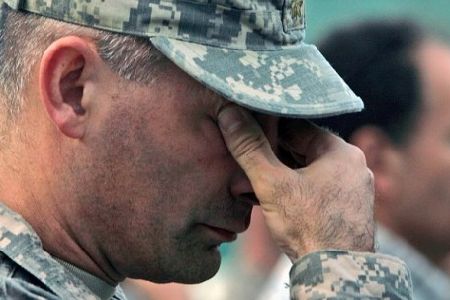As fighting in Afghanistan intensifies, troop morale nosedives

A new Army report indicates that troop morale in Afghanistan is at an all-time low. Its conclusions were drawn by a team of mental health experts that polled 911 soldiers, 335 Marines and 85 mental health workers in the Afghanistan Theater of Operations last summer, at a time when soldiers reported engaging in the most intense fighting since mental health surveys of troops began in 2003. The study was conducted during the (second) Afghanistan troop surge authorized by President Obama.
When asked about their level of morale, 46.5 percent of soldiers said that it was medium, high or very high last year, compared with 65.7 percent in 2005. For Marines, 58.6 percent said their morale was medium or higher, compared to 70.4 percent of Marines surveyed in 2006 (Because Marines were not in Afghanistan in significant numbers before Obama ordered a surge, their numbers in the report are compared to previous years in Iraq).
Almost 80 percent of troops said they have witnessed a friend being killed. Only half of soldiers had the same experience in previous years. About 50 percent of Army troops (and 56 percent of Marines) said they had killed someone. The report says the statistics were significantly higher than those of a similar study in 2009, as well as a survey taken after the troop surge in Iraq in 2007.
The true human cost of the now 10-year-old military campaign in Afghanistan, as many Americans are now painfully aware, can not be weighed in battlefield deaths alone. In fact, the psychological impact of battlefield stress has caused a record suicide rate in the military, with veterans especially suffering upon returning home from combat.
The military says it has been working to make its forces more emotionally resilient to traumatic combat events. Survey team leader Col. Paul Bliese thinks their efforts are working.
"We would have expected to see a much larger increase in the mental health symptoms and a much larger decrease in morale ... based on these incredibly high rates of exposure," said Bliese at a Pentagon press conference.
About 20 percent of troops said they had suffered from a psychological issue such as depression, anxiety or severe stress, double the number of soldiers who reported similar problems in 2005. It's also telling that the use of drugs for mental health was higher among civilians in the same age group. Perhaps the reason stems from a social stigma prevalent in the military that discourages soldiers from talking about psychological problems. According to the report, about half of soldiers questioned said they were afraid of appearing weak if they were to seek professional help for mental health problems.
Officials say they have been making headway in abolishing this attitude as well as boosting mental health staff which is present in Afghanistan at 1 for every 646 soldiers. In 2009, there was 1 mental health professional for every 1,123 soldiers.






